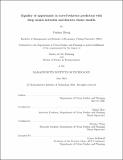Equality of opportunity in travel behavior prediction with deep neural networks and discrete choice models
Author(s)
Zheng, Yunhan
DownloadThesis PDF (8.409Mb)
Advisor
Zhao, Jinhua
Wang, Shenhao
Terms of use
Metadata
Show full item recordAbstract
Although researchers increasingly adopt machine learning to model travel behavior, they predominantly focus on prediction accuracy, while largely ignore the ethical challenges and the adverse social impacts embedded in the machine learning algorithms. This study introduces the important missing dimension - computational fairness - to travel behavioral analysis. It highlights the accuracy-fairness tradeoff instead of the single dimensional focus on prediction accuracy in the contexts of deep neural network (DNN) and discrete choice models (DCM). The author firstly operationalizes computational fairness by equality of opportunity, then differentiates between the bias inherent in data and the bias introduced by modeling. The models inheriting the inherent biases can risk perpetuating the existing inequality in the data structure, and the biases in modeling can further exacerbate it. The author then demonstrates the prediction disparities in travel behavioral modeling using the National Household Travel Survey 2017. Empirically, DNN and DCM reveal consistent prediction disparities across multiple social groups, although DNN can outperform DCM in prediction disparities because of DNN’s smaller misspecification error. To mitigate prediction disparities, this study introduces an absolute correlation regularization method, which is evaluated with the synthetic and the real-world data. The results demonstrate the prevalence of prediction disparity in travel behavior modeling, which can exacerbate social inequity if the prediction results without fairness adjustment are used for transportation policy making. As such, the author advocates for careful considerations of the fairness problem in travel behavior modeling, and the use of bias mitigation algorithms for fair transport decisions.
Date issued
2021-06Department
Massachusetts Institute of Technology. Department of Urban Studies and PlanningPublisher
Massachusetts Institute of Technology